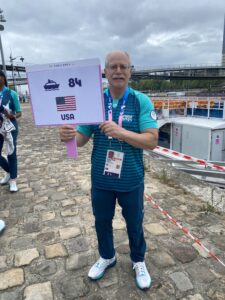Just like superstar gymnast Simone Biles, Trinity alumnus Robert Herbst ’80 is marking his third trip to the Olympics this year. But you will not see Herbst on the floor at the 2024 Paris games. His work is all behind the scenes.
Herbst earned a place among a cadre of 7,000 foreign volunteers whose work ensures the smooth functioning of the games. This year, he is supervising drug testing for gymnastics and basketball, but has also taken on additional roles and crossed paths with a number of household names.
The experience diverges from his career as an attorney. Herbst has served as the general counsel of several public companies and has worked as a substitute teacher at a K-12 private school in recent years.
What role do you play at the Paris Olympics and how did you get the position?
 I got the Olympic job by entering the competitive volunteer application process. Only some 7,000 foreign volunteers were selected out of some 300,000 applicants. At the Paris Olympics, I am helping to supervise the anti doping (drug testing), while also acting as a “Chaperone,” someone who notifies the athletes that they are being tested and escorts them through the testing process. This is similar to roles I had at the London 2012 and Rio 2016 Olympics, although this time I will concentrate on the marquee sports of gymnastics and basketball.
I got the Olympic job by entering the competitive volunteer application process. Only some 7,000 foreign volunteers were selected out of some 300,000 applicants. At the Paris Olympics, I am helping to supervise the anti doping (drug testing), while also acting as a “Chaperone,” someone who notifies the athletes that they are being tested and escorts them through the testing process. This is similar to roles I had at the London 2012 and Rio 2016 Olympics, although this time I will concentrate on the marquee sports of gymnastics and basketball.
I was also asked to help organize the historic Opening Ceremony, where some 10,000 athletes, coaches, and delegates paraded in boats down the Seine. My team was given the job of ensuring that the various delegations boarded the boats safely and that the boats shoved off on time. Due to my experience as a sailor and ability to speak American English, I was assigned Team USA, which was the largest delegation. I am happy to report that no one fell overboard.
Were you the one checking credentials to get on the boat?
Yes, and I carded [renowned basketball player] LeBron James. I said to him, ‘I know you are the flag bearer, but I still need to see your card. Them’s the rules.’ And he dutifully took out his credentials.
How does the testing process work and do all athletes participate?
Testing can be out of competition such as at the Olympic Village or during training. It can also take place during the competition. If it is a medal event, as opposed to a heat or preliminary, we test the medalists, as well as the fourth and fifth place finishers in case a medalist fails a test.
What are your days like during the Olympics?

The days can be long and hectic. I have been assigned numerous overnight shifts which go until 2:00 a.m. for prime time competitions that end late. Between those shifts, the time difference with New York, and the jet lag, my body does not know where it is and I am totally disconnected, like an astronaut.
The days start slowly with organizing and planning. They gain speed as we start to select the athletes to be tested, although we may not know the medalists until the end. Then we go full out as we notify the athletes and lead them through any medal ceremony, press conference, interviews, and the testing.
My favorite part is trying to ease the athletes through the process. They know that testing is necessary to ensure a level playing field, but it is a chore for those who are clean. We get the athletes at their rawest, literally as they exit the field of play. You can have ecstatic silver or bronze medalists or ones who are bitterly disappointed. I always treat the fourth place people with great patience, understanding, and gentleness. It helps that I look like an athlete, albeit older, because they figure I have been there myself.
As an athlete yourself, did you ever aspire to compete in the games?
I was in the discussion for the U.S. weightlifting team in 1980, my senior year at Trinity. The Olympics were in Moscow and Jimmy Carter decided the U.S. would boycott it because the Soviets invaded Afghanistan. I wrote an essay about the boycott and the College awarded me the Mears Prize in Physical Education and I went to law school [at Columbia Law School].
Any parting thoughts?
It is fantastic to watch people who are the best in the world at something, whether it is archery, badminton, or swimming. The fan should remember that sports is hard, that is why every sport scores for failure, which is something I tell the kids I coach. Pitchers have an ERA and goalies have a goals against average. Sports are hard and you are not going to be perfect, but you have to strive forward and keep going. When one is up close to the best in the world and see the effort, yet they still make a mistake, one has to be forgiving.
